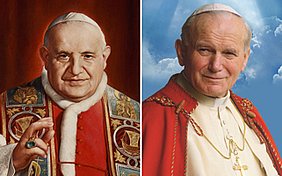We remember John XXIII as someone who, both as papal nuncio and, later as pope, demonstrated great love for the Jewish people, and great sympathy for their suffering during the years of the Shoah, when he discreetly but effectively used the influence of his office as a Vatican ambassador to help save hundreds of Jews whose lives were threatened by the Nazis. We recall the historic meeting in 1960 between John XXIII and the French Jewish historian Jules Isaac, at which Isaac presented a dossier of historical information about negative Christian attitudes toward Judaism, and asked the pope to consider a document about Jews and Judaism for the upcoming Second Vatican Council. Pope John welcomed Isaac's proposal, and the original draft document “On the Jews” would eventually become Vatican II's landmark 1965 declaration Nostra Aetate, on the Catholic Church's relationship to non-Christian religions, a document which has been foundational for the last half-century of Jewish-Christian relations. Although Pope John died before the document was finalized, his personal support for it played a major role in its eventual approval by the bishops. On numerous occasions, and by numerous actions, John XXIII showed tremendous warmth toward his Jewish sisters and brothers, and he was widely mourned by them when he died in June 1963.
We remember John Paul II as an eyewitness to the destruction wrought by the Shoah, which killed many of his Jewish friends and neighbours in Poland, and left a deep and lasting impression on him. From the time of his election, Pope John Paul made Jewish-Catholic relations a priority of his papal ministry, speaking to Jewish groups in Rome and throughout the world, presiding over the publication of major Catholic documents on interreligious dialogue and, in 1986, becoming the first pope since St. Peter to visit a synagogue (the Tempio Maggiore, the main synagogue of Rome). There, he spoke of the unique and organic bond which links Christianity to Judaism, and he spoke of the Jewish people as “our elder brothers,” a phrase which became so characteristic of his discourse about Jews. It was John Paul II who established diplomatic relations between the Holy See and the State of Israel in 1993, and in the year 2000, Israel welcomed him warmly, as a friend, when he came on pilgrimage, visiting Yad Vashem, meeting with Israel's political and religious leaders, and famously praying at the Western Wall, between whose ancient stones he placed a prayer asking God's forgiveness for Christian mistreatment of Jews, and committing the Church to a different type of relationship. John Paul II was deeply conscious of the tragedy of the Shoah, and repeatedly warned the world of the dangers of anti-Semitism, prejudice and racism. During the nearly 27 years of his pontificate, John Paul II advanced Jewish-Catholic dialogue in remarkable and lasting ways, and his example and teachings continue to inspire and inform those who work in interfaith relations.
These two men contributed greatly to re-shaping Catholic, and Christian, attitudes toward Judaism, and pointed the way toward a more respectful and positive interaction between Jews and Christians. Their teachings are a continuing source of inspiration and guidance, and their actions have shown the world that it is indeed possible for the ancient (and often troubled) relationship of Jews and Christians to change for the better. The last sixty years have proven that healing, reconciliation and renewal can occur where there is goodwill, openness and wise leadership.
The ICCJ wishes to express its congratulations on the occasion of their canonization. May their pioneering example continue to inspire us in the vital work they fostered and promoted, so that future generations of Jews and Christians can collaborate in respectful dialogue, in a spirit of understanding, mutual enrichment and genuine friendship.
(Author: Murray Watson; ICCJ Communications Officer)

